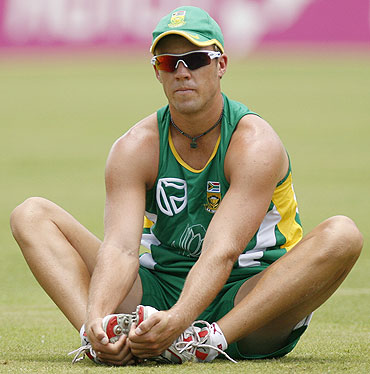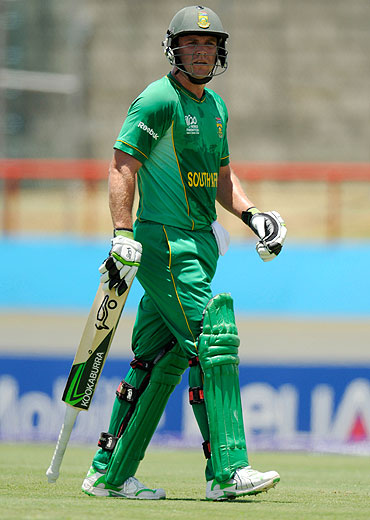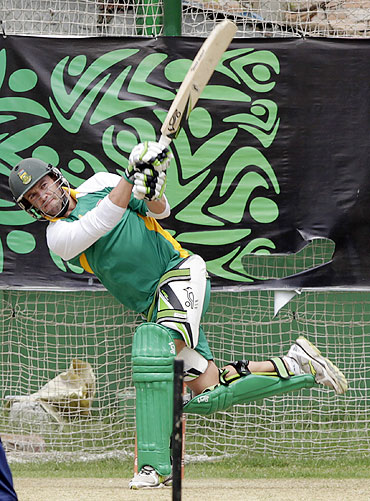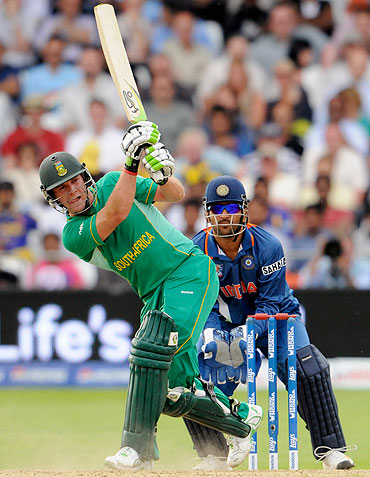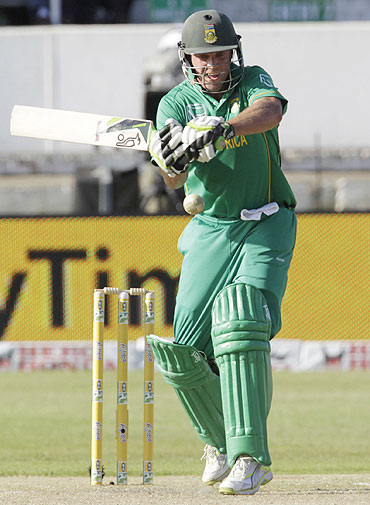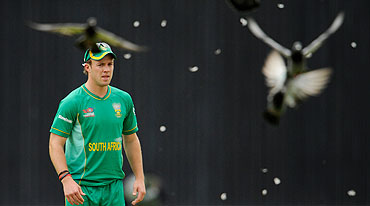 | « Back to article | Print this article |
'I captained my team at school but didn't enjoy it'
AB de Villiers may at first seem an odd choice to lead South Africa's limited-overs sides since his only previous experience as a captain was at school and even then he did not enjoy it.
Throw in the concern that his dual role as batsman and wicket-keeper is already causing and his appointment as the man to lead South Africa into a new era seems more questionable.
"I captained my team at school (Afrikaans High School, Pretoria) for a few games but I didn't enjoy it so much," De Villiers said.
"I was more focused on my batting then and playing other sports like rugby," he said in an interview.
'Captaining South Africa was definitely not one of my goals'
But, having been persuaded to become limited-overs captain, he is confident of bringing success to his new role.
De Villiers takes over from Graeme Smith who stood down as skipper of the one-day international (ODI) and Twenty20 sides after the World Cup but will continue as test captain.
Despite his initial misgivings, the 27-year-old has begun to acquire a taste for the job following his appointment last week.
"Captaining South Africa was definitely not one of my goals, but I started believing I could do it when Graeme Smith said I had a lot of leadership qualities."
'I'm the proudest man in the world at the moment'
"He said I should take more responsibility, act more like a leader and talk more in team meetings.
"Henning Gericke (mental conditioning coach) and Corrie van Zyl (South Africa coach until the World Cup) saaid I could be a captain if I wanted to be one. That's when I started to believe," said De Villiers.
"But I realise I'm following in huge footsteps -- people like Hansie Cronje, Shaun Pollock and Graeme - who's been the best captain I've played under.
"I really want to make it work and I'm prepared to give up everything to make it work. I'm the proudest man in the world at the moment, because I love my country and I'll do anything to make South Africa proud.
'I truly believe I have qualities as a captain'
"I truly believe I have qualities as a captain and I have to make up my own mind -- captain the team my way, not how Hansie or Graeme did it.
"As a captain, I can't make the same mistake twice. As a player, you can get away with that, but if the captain does that then it affects the whole team," De Villiers said.
South African cricket, after yet another World Cup failure, is entering a new era with the appointment of De Villiers and a new coach in Gary Kirsten.
Kirsten followed a successful 11-year international career for the Proteas by steering India to World Cup glory and the number one ranking in test cricket.
He was a top-order batsman who scored 7,289 test runs and 6,798 in ODIs, his career being distinguished by a remarkable determination to succeed.
'I think Gary and I will complement each other a lot'
"Gary was one of my biggest heroes growing up and I have huge respect for him and the passion, pride and fighting spirit he showed," said De Villiers.
"He's shown the same qualities as a coach, especially at the World Cup, and I hope I'll be able to help bring those into our side too. I'd like to be the same sort of captain, showing resilience.
"I think we'll complement each other a lot, Gary's just a wonderful coach and a top-class human being," he added.
De Villiers' audacious batting has brought him 4,741 runs in 66 tests and 4,523 runs in 119 ODIs, but there has been concern that his current dual role could affect his batting.
The multi-talented sportsman acknowledged the added responsibility of keeping wicket was gnawing away at him.
"We're definitely going to have to discuss the wicket-keeping, although it doesn't have to happen right now. But it is important to decide if there is too much on my shoulders," he said.
'It's an unbelievable responsibility'
While De Villiers had an excellent World Cup, scoring 353 runs at an average of 88.25, South Africa's exit in the quarter-finals still causes anguish for players and fans alike.
He realises there will be extra pressure on him to ensure this is rectified at the 2015 tournament in Australia.
"Obviously, we have a history of not performing well in big events. We didn't play badly overall, but went down when the pressure was on us again.
"But there's a fresh look in the side now, which is good, and then it's up to the leaders to work together with trust. But it's an unbelievable responsibility," De Villiers said.

© Copyright 2024 Reuters Limited. All rights reserved. Republication or redistribution of Reuters content, including by framing or similar means, is expressly prohibited without the prior written consent of Reuters. Reuters shall not be liable for any errors or delays in the content, or for any actions taken in reliance thereon.
